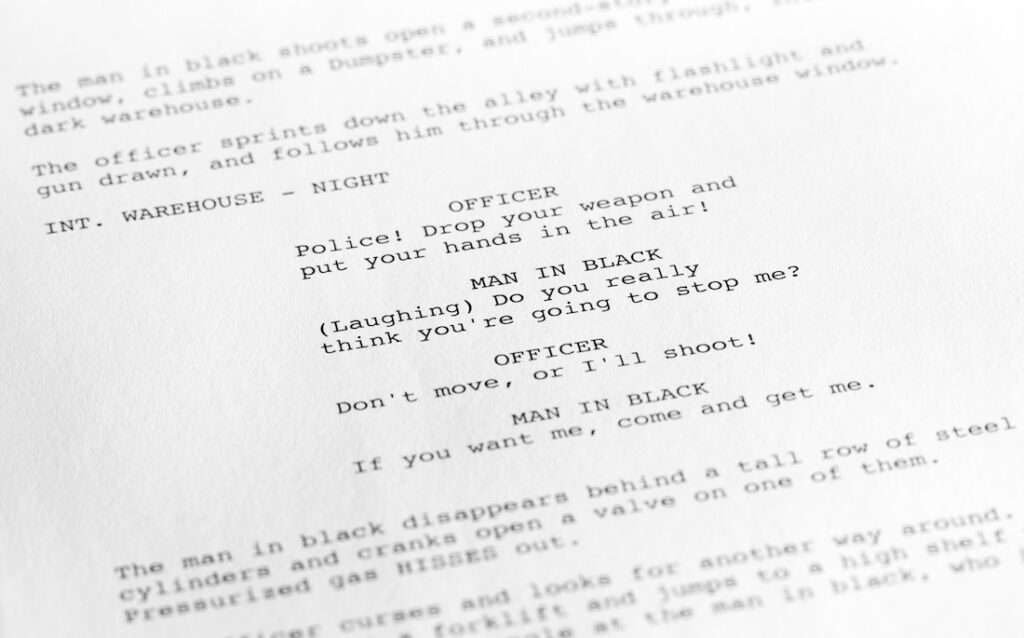Handling rejection is hard for anyone in any walk of life. For screenwriters, it’s not just a rite of passage — it’s a continual fact of life that never goes away, no matter what level you accomplish within the film and television industry. You get just as much rejection, and far, far more objective and subjective notes when you’re a professional screenwriter working on assignment for studios, production companies, networks and streamers. But how do you handle being told through script coverage that your script isn’t up to par, isn’t ready for the industry and sometimes is just outright terrible?
Here, we’ll delve into the dynamics of interpreting script coverage notes and how script coverage can make you a better — and more industry-ready — screenwriter.
Read More: What Is Script Coverage?
Don’t Take Script Coverage Notes Personal
Script consultants aren’t trying to insult you. They are offering a reaction to the screenplay you have shared with them for that very purpose — an honest reaction. When you submit your scripts for coverage, you shouldn’t be doing so to find instant admiration and praise. You should be submitting your work to get an in-depth outside perspective, which is something very difficult for a screenwriter to experience when reading their own work. Script coverage is there to help you gain an industry perspective on the screenplays you’re looking to submit to studios, networks, streamers, production companies, agencies and management companies. It should never be taken personally. It’s there to help.
Consider the Source of the Script Coverage
When you’re a pro and get word from your executive or producer that the draft you’ve handed in is terrible, there’s not much you can do. You’ll have to hope they haven’t replaced you — and then apply the objective notes for a better draft.
However, when you’re earlier on your screenwriting journey and using script coverage services to better your craft, there’s a higher learning opportunity that will better prepare you for success in those professional assignments.
The best script coverage services — like ScreenCraft’s genre-specific script notes — employ professional readers with years of experience reading for the top studios, production companies, agencies, management companies, networks and streamers. Such experience is required to become a script consultant. And their sole purpose is to help prepare screenwriters — and their screenplays — for the tough industry spec script market.
When you consider them as the source, you’ll understand that the feedback and coverage notes within are not purely subjective rants. Instead, the insights they offer are a direct reaction similar to what you should expect when you submit your screenplays to major competitions, fellowships and especially film and television industry development executives, producers, agents, managers, directors, etc.
They are offering you the industry reaction. Thus, it’s imperative that you look at their notes and ratings with an open mind, void of emotional reactions and defensive mindsets. It’s not easy to do that, but let’s discuss some ways that will help you find the good in the terrible. (We do a deep-dive of script coverage ratings in another post, so go check that out if you want more information.)
Pay Attention to Script Coverage Notes that Trend with Your Scripts
The easiest step to accepting and learning from negative feedback is to first seek out the trends that you’re reading in the reactions to your screenplays. It’s one thing to have one person or script coverage service give you a bad review of your work. When you start to see the same notes trending between coverage and individuals reading your work, you should start to see that it’s less about a subjective viewpoint and more about the objective issues you’re writing is causing.
It’s easy for screenwriters to scoff at trending script notes, which usually create a negative “me against the world” approach. Sure, plenty of studios passed on some of the most successful movie scripts ever produced. However, it’s wise not to fall into immediate delusions of grandeur. Most of the time when script notes are trending toward negatives, it means that there are objective issues you may need to address.
Examples:
- Poor formatting which makes the script difficult to read.
- Wooden dialogue that needs to be punched up.
- Inconsistent tone.
- Lacking character development.
- Slow pacing.
Whatever the trending issues may be, pay attention to them. Don’t think of them as nothing more than subjective reactions.
Subjective Negative Reactions to Your Script Should Not Be Taken Lightly
There’s a stark difference between objective and subjective reactions.
Objective script reactions are not influenced by personal feelings, opinions or biases. Instead, they are based on the needs, wants and trends of the industry. They can be communicated and described in a neutral and impartial manner. Possible objective script notes include:
- “The budget would be too high for most studios and production companies to consider.”
- “There is not enough diversity in the cast of characters.”
- “The story and concept have been done before.”
- “The action and plot points are too derivative of previous films.”
- “The market for the subgenre is too saturated.”
Subjective script reactions are responses influenced by personal feelings, opinions and biases. These types of reactions can vary from person to person, based on personal interpretations, as well as any individual’s wants, needs, personal preferences and emotional baggage.
However, that’s how a screenwriter’s work will always be received by the audience — with subjectivity. All art forms are viewed with subjective eyes by the consumers of the art. And it goes far beyond that in the film and television industry as well.
Studio/Network/Streaming executives, producers and directors/showrunners are the driving force of entertainment. They will often make decisions based primarily on what they want their name — or company’s name — attached to.
So you can’t escape subjectivity. Nor should you ignore subjective opinions when it comes to script coverage. If a script consultant didn’t like your script, pay attention to the reasons they offer. The objective reasoning will be easy to spot (see above for examples). The subjective reasoning point toward more personal reactions.
- “The plot twists didn’t shock me. I saw them coming a mile away.”
- “I didn’t like the protagonist. They came across as distractingly unlikeable to me.”
- “The pacing felt very slow in the opening act.”
- “The main character’s journey didn’t resonate with me on a personal level, which made the story less emotionally impactful.”
- “The humor and jokes weren’t funny to me.”
These subjective reactions aren’t objective reasons to change your script. However, subjective reactions need to be, at the very least, considered. Why? Because you’re going to get subjective reactions from every single person you send the script to. And even if the script gets produced and the movie comes out, you’re going to get thousands or millions of subjective reactions. It’s part of the art form of fiction — especially something so easily consumable as film and television.
Embrace negative script notes — or script notes that go against your original intentions. Trust in the script consultant’s reaction, knowing that their reaction may likely fall in line with the majority of decision-makers reading your script.
Ask yourself, “What if they’re right?” Then, consider the solutions that your creative mind could conjure when considering the subjective reactions to your work. You just may discover that not only are they right, but their pointing their subjective opinions out actually led to better versions of your story and characters.
Find the Note Behind the Note
Addressing surface-level issues with your script is easy. But the key to understanding why your script may be lacking (or terrible) in the eyes of those writing script coverage, is looking for the underlying problem(s) that a script reader may have with your script. This is where finding the note behind the note is key.
To do this, you need to delve deeper into the feedback and try to grasp and identify the core issue(s) the reader is trying to convey.
- Analyze the feedback.
- Consider the broader implications.
- Identify the root cause of their subjective reactions.
If the script coverage states that the antagonist’s motivation is weak, the note behind the note may be pointing to the issue of the character’s arc lacking a clear emotional journey. If the protagonist’s motivation is weak, maybe the stakes need to be heightened to make their story more engaging.
If the script coverage points out that the dialogue is unnatural and wooden, the note behind the note may be that the character’s dialogue may lack authenticity or a distinct voice that separates them from other characters.
If the script coverage touches on the ending, calling it too predictable, the note behind the note may be that the screenplay’s climax suffers from a lack of surprises or doesn’t subvert expectations that theatergoers crave. You may need to consider exploring alternative resolutions or bigger twists.
Understand and Realize All Screenwriters Need to Evolve and Grow
Let’s keep it real. Sometimes your script sucks. And sometimes it takes an outside party to help you realize this. Even pro screenwriters write duds. It happens — more often than we’d like.
Script coverage helps you evolve and grow as a screenwriter. You’re not going to do that by being told how amazing every single thing you write may be. Sure, positive reinforcement is good. And, yes, the best script coverage will also point out the strength of your scripts, as well as their weaknesses. But constructive criticism is key to becoming a better screenwriter. You need it. And you should seek it out.
Consider All Script Coverage Notes — But Don’t Be Held Hostage by Them
If you do all of the above, and still feel that your script is exactly what you want it to be, then you have the power and freedom to reject it. As shown above, it’s wise to consider each note — and the notes behind the notes. But, in the end, it’s your choice. You can cherry-pick what you feel resonates best with your script and toss the rest. It’s up to you. You should never feel held hostage creatively by script coverage. Nor should you rely on script coverage to write the script for you.
Screenplay coverage is a tool — a very effective one that can help you jumpstart your evolution as a screenwriter. Eventually, when you become a pro, you won’t be able to use it while you’re under contract. So, enjoy it while you can. And use it to help you and your writing get to a point where you’re relying on yourself to complete that paid writing assignment.
Read More: What You Should and Shouldn’t Expect from Script Coverage
Ken Miyamoto has worked in the film industry for nearly two decades, most notably as a studio liaison for Sony Studios and then as a script reader and story analyst for Sony Pictures.
He has many studio meetings under his belt as a produced screenwriter, meeting with the likes of Sony, Dreamworks, Universal, Disney, and Warner Brothers, as well as many production and management companies. He has had a previous development deal with Lionsgate, as well as multiple writing assignments, including the produced miniseries BLACKOUT, starring Anne Heche, Sean Patrick Flanery, Billy Zane, James Brolin, Haylie Duff, Brian Bloom, Eric La Salle, and Bruce Boxleitner, the feature thriller HUNTER’S CREED, and many produced Lifetime thrillers. Follow Ken on Twitter @KenMovies and Instagram @KenMovies76.
CHECK OUT OUR GENRE-SPECIFIC NOTES AND GET YOUR SCRIPT IN SHAPE!
The post What to Do When Your Script Coverage Tells You Your Script is Terrible appeared first on ScreenCraft.
Go to Source
Author: Ken Miyamoto





